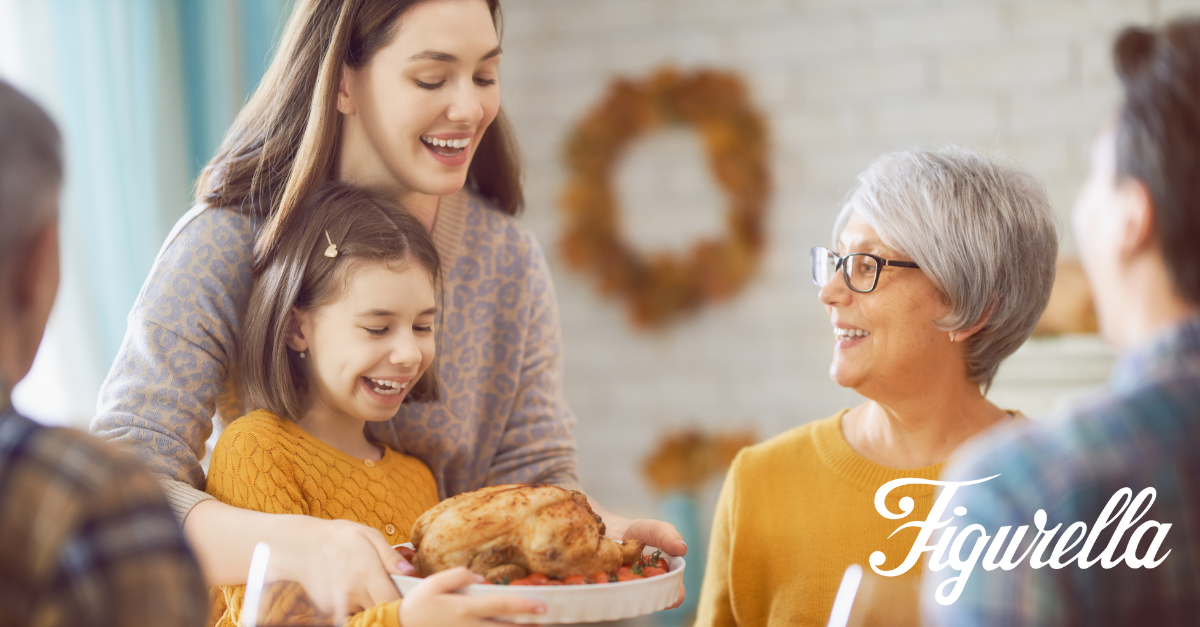Eating too much every once in a while is normal. So is eating for emotional reasons. What is not normal and should not become a habit is doing this too often or keep up with doing it because the mistake was already made. How many times have you said “tomorrow I’ll start a diet” or “this is the last time I eat so much”? Probably a lot. But reality is that it never happens! It takes much more than a regret to make a real change. This is what we are going to talk about in this blog, taking advantage of the current problem we are facing at Figurella: thanksgiving “week”!
HOLI-DAYS
One of the most common arguments we have with our clients is about the fact that each single holiday has a main meal that could interfere with a potential diet or nutrition plan. Not an entire week made of 3 meals a day and all the potential temptations that are presented to us as snacks!
We tend to use the holidays as a period of time in which healthy nutrition will be completely impossible and in which a stop to whatever type of commitment we’ve made is necessary. But reality is that we can plan ahead and make sure to one, enjoy the holidays and the food related to it, and two, make the right healthy choices to stay true to our commitments.
Holidays are great moments of family and friends reconnections and yes, food and drinks are a big part of it. What we are trying to teach at Figurella is that it is possible to avoid disrupting completely what we have been working on in terms of better choices and body shape. If this lesson is not understood, most of the time we end up sabotaging our missions completely. Let’s read more in the next paragraph.
Regrets lead to more mistakes
Has this ever happened to you? You eat the last bite of your delicious yet oversized meal and you loosen your belt, the waiter walks by and hands you the dessert menu. You know you are full. You know you should stop. But, you place your dessert order. And, you eat the whole thing. Then you hate yourself for making that decision.
New research from the University of Texas Southwestern Medical Center suggests that ghrelin, the hormone that your body secretes when you are hungry, might also act on the brain influencing the hedonic aspects of eating behavior. The result is that we continue to eat “pleasurable” foods even when we are full.
A very common behavior is to start a food/exercise commitment and suddenly fall into a temptation. “My neighbor passed by with a cake”, “my parents are in town”, “it’s my best friend’s birthday”, “I have to do my hair and I can’t mess it up”. These are some of the excuses that we use when we stop our diet or our exercise routine, but the worst is yet to come.
These ridiculous excuses are quite often followed by a buffer period of time that we need to recommit to our goals. These periods could be “next week”, “next month”, “after the holidays”, “at this point let me wait and do it after my birthday month”.
It can be hard to stop overeating on your own, particularly if there are deep-rooted emotional problems involved. For this reason it is important to find support and keep seeking for the right way of handling this issue.
What time should I stop eating?
Talking about time of the day instead, we should always be aware about what time is best to eat, until what time and what food is better than others in the different meals of the day.
As a general guide we should have our last meal between one and three hours before going to sleep. This gives our body time to digest avoiding storing the food as fat.
Another rule to follow is to decrease the portion and the heaviness of the meals moving forward in the day. Anything sugary would be better processed in the first part of the day and same thing for the carbohydrates.
Following simple rules, at least for the majority of the time, could save a lot of headaches and prevent gaining excess weight.







